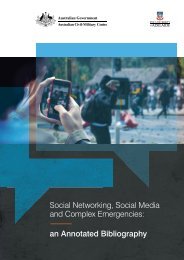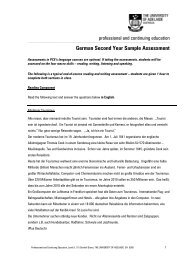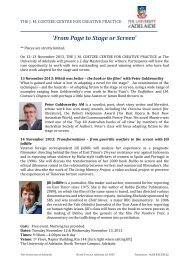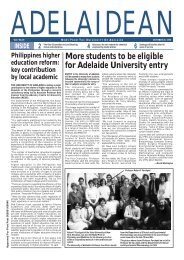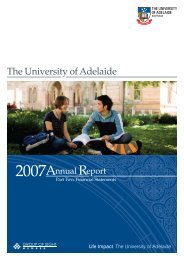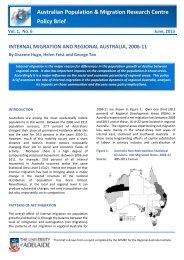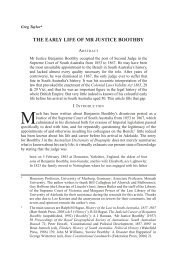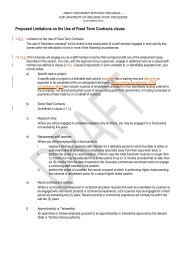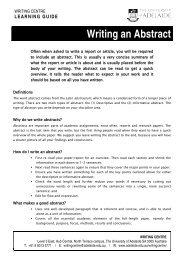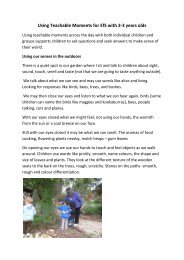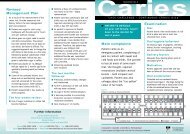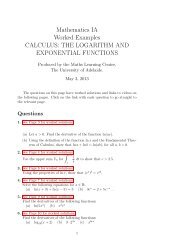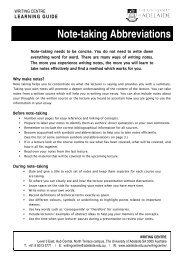Unbridling the Tongues of Women - The University of Adelaide
Unbridling the Tongues of Women - The University of Adelaide
Unbridling the Tongues of Women - The University of Adelaide
You also want an ePaper? Increase the reach of your titles
YUMPU automatically turns print PDFs into web optimized ePapers that Google loves.
Learning for <strong>the</strong> future<br />
interconnections between state and education, and state and religion. No minister<br />
<strong>of</strong> religion could be a member <strong>of</strong> <strong>the</strong> central Board <strong>of</strong> Education which was appointed<br />
to administer government grants to schools; schools receiving funds ‘must<br />
provide good secular instruction, based on <strong>the</strong> Christian religion, but apart from<br />
all <strong>the</strong>ological and controversial differences <strong>of</strong> discipline and doctrine’; teachers<br />
should read a chapter from <strong>the</strong> old and new testaments every day. 4 This legislation<br />
remained in force until 1875, and after that year bible readings were given only on<br />
request and <strong>the</strong>n, out <strong>of</strong> school hours. Denominational religious instruction did<br />
not appear in South Australian state schools until 1939. 5<br />
Never<strong>the</strong>less, questions about <strong>the</strong> place <strong>of</strong> religion in education continued to<br />
provoke frequent and fervent debate. In 1850, Spence considered religious instruction<br />
integral to any education, and her difficulties with her own religious beliefs<br />
mean that she was pr<strong>of</strong>oundly troubled at <strong>the</strong> prospect <strong>of</strong> teaching. Mrs X ‘must<br />
keep <strong>the</strong> moral responsibility <strong>of</strong> her children to herself’, she wrote in her diary, when<br />
she was about to go to a live-in post as ‘nursery governess’: ‘I shall not have it. I will<br />
do <strong>the</strong>m as much good and as little harm as I can, but I hope I may not have <strong>the</strong>ir<br />
souls to answer for. It is a dark subject’. 6 By 1856, her despair and anxiety dispelled<br />
by her conversion, she had translated dogma into general morality. When she added<br />
a youthful voice to <strong>the</strong> general clamour in <strong>the</strong> press, she argued not for religious<br />
instruction, but that<br />
teachers endowed by public money … should be bound to teach morality,<br />
not upon utilitarian principles, not because honesty is <strong>the</strong> best policy,<br />
but because goodness, truth, honesty, courage, patience, temperance and<br />
obedience to law are eternally and immutably right, noble, and beautiful<br />
and in conformity with <strong>the</strong> will <strong>of</strong> our Heavenly Fa<strong>the</strong>r.<br />
She was prompted to <strong>the</strong> expression <strong>of</strong> such worthy sentiments by precisely <strong>the</strong> kind<br />
<strong>of</strong> interventionary motives that Kay Daniels has ascribed to her. She considered that<br />
religious and moral principles were better taught by parents, but went on to observe:<br />
when I look at a shipload <strong>of</strong> female immigrants, and consider that <strong>the</strong>se<br />
are <strong>the</strong> future mo<strong>the</strong>rs <strong>of</strong> South Australia; when I recollect how much<br />
<strong>the</strong> education <strong>of</strong> principles and feeling has been neglected in <strong>the</strong> mo<strong>the</strong>r<br />
country, I maintain that we ought not to trust implicitly to parental<br />
guidance. 7<br />
95



